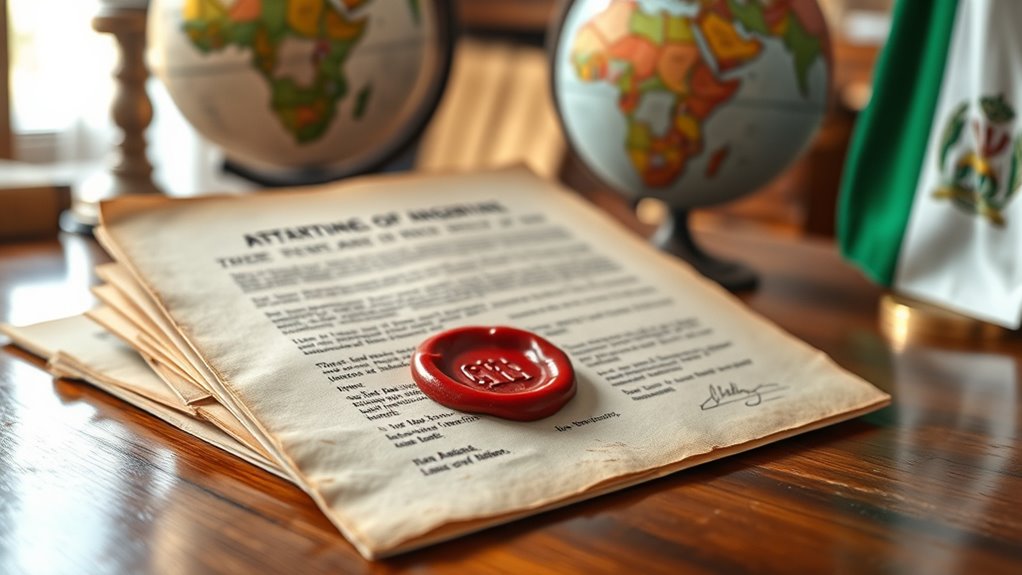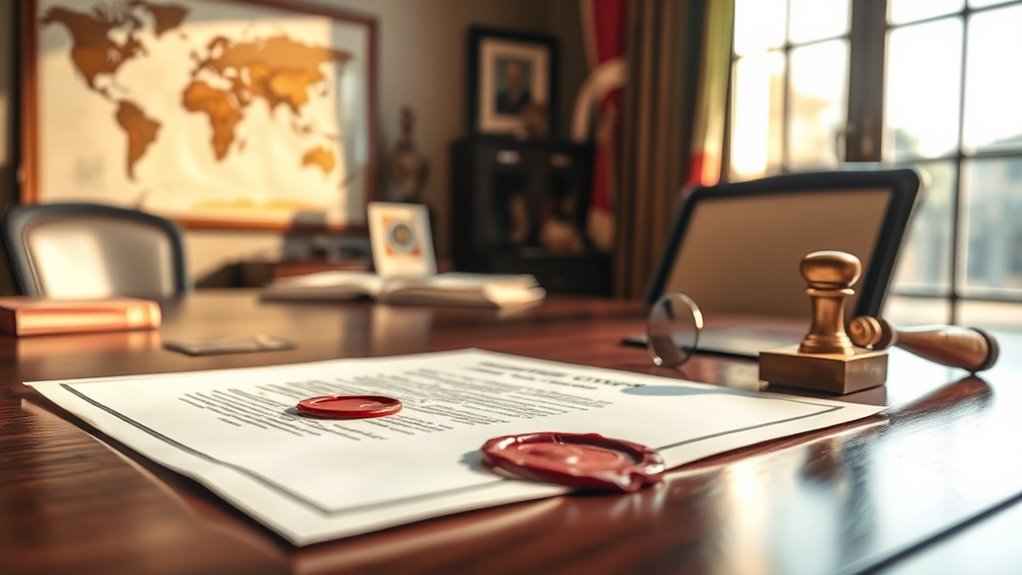A Power of Attorney in Nigeria is a legal document authorizing an agent to act for a principal, requiring certified translations for accuracy and compliance in multilingual contexts. Translation Africa provides specialized services, ensuring adherence to Nigerian laws and international standards through expert linguists and rigorous verification processes. These translations minimize disputes and uphold document integrity, while further insights reveal key benefits and scenarios for effective legal applications.
Quick Summaries
- Certified translations for Power of Attorney in Nigeria ensure legal compliance and authenticity through professional services like Translation Africa.
- They maintain the original document’s intent, preventing errors that could invalidate agreements in Nigerian contexts.
- The process involves submitting your Power of Attorney to accredited providers for accurate translation, review, and notarization.
- Translations adhere to Nigerian laws, including the Evidence Act, with certified translators ensuring precision and cultural nuances.
- This service supports international dealings, property transactions, and legal proceedings by minimizing language-related disputes.
What Is a Power of Attorney in Nigeria

A Power of Attorney in Nigeria is a legal document that allows an individual, known as the principal, to authorize another person, called the agent or attorney-in-fact, to make decisions or perform actions on their behalf. This instrument is governed by the Powers of Attorney Act and common law principles, ensuring it is a binding agreement when properly executed. It can be classified as general, granting broad authority over financial, property, or personal matters, or specific, limiting powers to defined tasks such as property sales or contract signings.
In Nigeria, the document must be in writing, signed by the principal, and often witnessed or notarized for validity. The agent is required to act in the principal’s best interests, adhering to fiduciary duties like loyalty and care. However, the Power of Attorney remains revocable by the principal at any time, provided they retain mental capacity, therefore maintaining control over their affairs. This legal tool is essential for situations where the principal is unavailable or unable to act personally.
Importance of Certified Translations for Legal Documents

Certified translations play an essential role in ensuring the accuracy and legal validity of documents like a Power of Attorney in Nigeria, where multilingual contexts can introduce risks of misinterpretation. They prevent errors that could invalidate legal agreements, safeguarding the intent of the original document in court or official proceedings. In Nigeria’s diverse linguistic landscape, certified translations uphold international standards, such as those from the International Organization for Standardization, ensuring documents are recognized by authorities and institutions. This precision minimizes disputes arising from language barriers, protecting parties’ rights and facilitating seamless legal processes. Furthermore, certified translations enhance credibility, as they are performed by qualified professionals who attest to the document’s fidelity, thereby reducing potential liabilities in cross-border transactions. Ultimately, they foster trust and compliance within Nigeria’s legal framework, making them indispensable for effective document handling.
The Process of Getting Certified Translation Services

The process of obtaining certified translation services for a power of attorney in Nigeria begins with Step One, which involves initial assessment and selection of a qualified translator. Understanding document needs is essential, as it requires identifying all relevant legal papers and their specific language requirements. Certification steps follow, encompassing verification by accredited bodies to guarantee accuracy and compliance.
Step One
First, individuals seeking certified translations for a power of attorney in Nigeria must identify reputable service providers with proper accreditation. This involves researching firms affiliated with recognized bodies like the American Translators Association or local equivalents, guaranteeing they specialize in legal documents. Reputable providers employ certified translators proficient in both English and relevant Nigerian languages, such as Hausa, Igbo, or Yoruba, to maintain accuracy and cultural nuance. Verification can include checking online reviews, client testimonials, and professional certifications to avoid subpar services that could invalidate the power of attorney. By prioritizing established providers, individuals minimize risks of errors or legal complications, setting a solid foundation for the translation process. This initial step guarantees reliability and compliance with Nigerian standards.
Document Needs
Individuals pursuing certified translations for a power of attorney in Nigeria must gather essential documents to facilitate the process. These include the original power of attorney, valid identification such as passports or national IDs, and any supporting affidavits or forms. Ensuring all documents are current and legible minimizes delays. This preparation helps translation services verify authenticity and accuracy.
| Document Type | Description |
|---|---|
| Original Power of Attorney | The primary document requiring translation, including all signatures and dates. |
| Valid Identification | Proof of identity for the principal, such as a passport or driver’s license. |
| Supporting Affidavits | Any sworn statements that contextualize the power of attorney. |
| Translation Request Form | A form outlining specific translation requirements and languages. |
Certification Steps
After preparing the required documents, obtaining certified translation services for a power of attorney in Nigeria entails selecting a qualified provider, submitting materials for review, and following verification protocols to guarantee compliance and accuracy. Individuals should first research reputable translation agencies, such as those affiliated with Translation Africa, verifying they hold certifications from recognized bodies like the Nigerian Institute of Translators and Interpreters. Once selected, submit the original power of attorney and any supporting documents for initial assessment. The provider then conducts a thorough translation by bilingual experts, followed by a verification process that includes proofreading, stamping, and notarization to meet legal standards. This guarantees the translated document is admissible in Nigerian courts, preventing potential disputes. Finally, clients receive the certified copy, often with a seal affirming authenticity, completing the process efficiently.
Key Requirements for Power of Attorney Translations
Translating a Power of Attorney document for legal use in Nigeria requires precise adherence to specific standards, including accuracy, certification by qualified professionals, and compliance with local regulations to guarantee its validity and enforceability. Key requirements encompass using certified translators who are proficient in both source and target languages, ensuring the translation mirrors the original document’s intent without omissions or alterations. In Nigeria, translations must align with the Evidence Act and other relevant laws, often necessitating bilingual expertise in English and local dialects where applicable. Additionally, the document should include a sworn affidavit or declaration from the translator, affirming its authenticity. Proper formatting is essential, with clear identification of the translator’s credentials and a dated signature to prevent disputes. These elements collectively uphold the document’s legal integrity in Nigerian courts. Finally, translations may require verification against international standards if cross-border enforcement is needed, emphasizing meticulous attention to detail.
How Translation Africa Ensures Accuracy and Compliance
How does Translation Africa uphold accuracy and compliance in Power of Attorney translations? Translation Africa employs certified linguists with legal expertise to handle sensitive documents, ensuring precision in every step. Their process integrates advanced quality assurance techniques tailored to Nigerian regulations, minimizing errors and maintaining legal integrity.
- Certified Translators: Only professionals with verified credentials and experience in legal translations are assigned, guaranteeing linguistic accuracy.
- Rigorous Review Process: Each translation undergoes multiple layers of editing and verification by independent experts to confirm fidelity to the original text.
- Compliance Protocols: Translations adhere to international standards like ISO certifications and local Nigerian laws, with final certifications provided for authenticity.
Benefits of Professional Translation for Legal Matters
Professional translation services deliver key advantages in legal matters, particularly for documents like Powers of Attorney, by ensuring precise language that upholds legal integrity and minimizes misinterpretation risks. In legal contexts, these services maintain the original document’s intent, preventing errors that could compromise cases or lead to invalidation. They promote adherence to regulatory standards, such as those in Nigeria, through expert knowledge of terminology and cultural nuances. Moreover, professional translators prioritize confidentiality, safeguarding sensitive information during the process. This level of accuracy enhances document credibility, making them more likely to be accepted in official settings. Ultimately, such translations save time and resources by avoiding costly revisions or disputes, fostering smoother legal operations and greater overall efficiency.
Common Scenarios for Power of Attorney Translations in Nigeria
In Nigeria, power of attorney documents often require translation in several common scenarios, such as international business dealings, property transactions involving expatriates, or legal proceedings where multilingual accuracy is essential. These situations demand certified translations to bridge language barriers and uphold legal standards.
- International Business Dealings: Translations enable seamless partnerships between Nigerian entities and foreign investors, ensuring contracts are enforceable across borders and reducing misinterpretation risks.
- Property Transactions with Expatriates: Accurate translations of power of attorney documents facilitate property sales or management for non-Nigerian residents, preventing disputes over ownership or inheritance.
- Legal Proceedings: In courts, translated documents maintain evidence integrity in multilingual cases, such as disputes involving diaspora Nigerians, ensuring fair and precise judicial outcomes.
Frequently Asked Questions
How Much Does Certified Translation Cost?
The cost of certified translation services varies based on factors such as language pair, document length, and provider expertise. Prices typically range from $20 to $100 per page, depending on complexity and urgency. Individuals seeking services should obtain quotes from multiple sources for accurate estimates.
How Long Does the Translation Process Take?
The translation process duration varies based on factors like document length, complexity, and language pair. Typically, standard documents take 2-5 business days, while more detailed ones may require up to two weeks for completion.
Can I Use Online Tools for Translations?
The inquiry into using online tools for translations is common. Such tools offer convenience and speed, but they often lack accuracy for official documents. Professionals are recommended to guarantee reliability and precision in critical contexts.
What Languages Does Translation Africa Offer?
Translation Africa offers translations in numerous languages, including English, French, German, Spanish, Arabic, Portuguese, Chinese, Russian, and various African dialects such as Yoruba, Igbo, Hausa, and Swahili, ensuring extensive global coverage.
Is Notarization Needed for These Services?
The question of whether notarization is needed for translation services depends on document type and jurisdiction. For legal or official purposes, it often guarantees authenticity and compliance. Requirements vary; consulting experts is advisable to meet specific standards and avoid complications.



